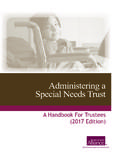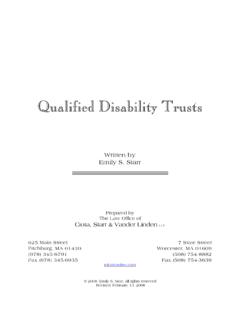Transcription of Disbursement Information Manual
1 2017 Commonwealth Community Trust All Rights Reserved Disbursement Information Manual TABLE OF CONTENTST able of Contents .. 1 Welcome .. 3 Key Terms .. 4 Responsibilities of the Trust Administrator .. 7 Government Benefits: Supplemental Security Income (SSI) and Medicaid .. 7 Other Government Benefits .. 8 Reporting Requirements to Government Agencies Fulfilled by CCT .. 9 Helpful Information Regarding Reporting Changes to the Beneficiary s Status to Government Agencies for Medicaid and/or SSI Recipients .. 9 Guidelines for Disbursements .. 10 The Disbursement Decision-Making Process .. 11 The Disbursement Request Process .. 11 Guidelines to Complete the Payment Request Form .. 11 How to Complete a Payment Request Form and Sample Payment Request Form .. 12 Who Can Receive Funds .. 14 How to Submit a Payment Request Form .. 14 September 2017 Turnaround Time .. 14 Reasons a Disbursement Request Could be Denied or Require Further Discussion .. 15 Reasons a Disbursement Request Could be Delayed.
2 15 Examples of How Trust Funds Can be Spent .. 16 Home Purchase and Renovations .. 18 I. Home Purchase .. 18 II. Home Renovations .. 19 Buying a Vehicle .. 19 Care Provider .. 20 Case Management Services .. 20 Vacation .. 21 Pre-Need Burial Arrangements .. 21 Travel .. 21 Budget Form and Objectives of the Trust Form .. 22 Family and Beneficiary Information Form for third - party Trusts .. 22 Parents Responsibility for a Minor .. 22 Holiday Expenses .. 22 Weapons, Alcohol, and Bail .. 23 Pre-Paid Credit Card (True Link) .. 23 Tax Information .. 24 Upon the Death of the Beneficiary of a First- party Trust .. 24 Upon the Death of the Beneficiary of a third - party Trust .. 25 Closing the Trust .. 25 How to Contact CCT .. 25 2 WELCOME Greetings, We are pleased to welcome you to Commonwealth Community Trust (CCT) and want you to have a positive experience. CCT is a nonprofit organization tha t administers Pooled special needs Trusts and is governed by a volunteer Board of Directors.
3 CCT has provided trust administration services since 1990 and has established an outstanding reputation for quality customer service. We have a big job to do as the Trust Administrator and are charged with the responsibility of making Disbursement decisions. As such, we look forward to working with the Advocate(s) to let us know what the needs of the Beneficiary are. We ask that you recognize that a Pooled special needs Trust is not a checking account, an ATM, a debit or credit card, or a money store. We do the best job that we can within the constraints of our responsibilities as the Trust Administrator. The purpose of this guide is to provide general Information about the Disbursement process. Please keep this Manual for future reference and do not hesitate to contact CCT with any questions or feedback. Information is also available on our website, , under the Disbursements tab. We look forward to working with you to enhance the life and well-being of the Trust Beneficiary.
4 Sincerely, The Staff of Commonwealth Community Trust3 2017 Commonwealth Community Trust All Rights Reserved KEY TERMS AS USED BY CCT Advocates(s): The Advocate(s) is authorized to make Disbursement requests by signing and submitting the Payment Request Form. If there is a need to change an Advocate for the trust account, contact CCT. Primary Advocate: Named by the Grantor, the Primary Advocate is responsiblefor making requests for disbursements that are for the benefit of theBeneficiary. The Primary Advocate will have access to financial statements andcan be the Beneficiary, a Guardian, Conservator, Power of Attorney, familymember, case worker, friend and/or someone who is familiar with the needs ofthe Beneficiary. The Primary Advocate will receive financial account Information ,tax documents, and other official correspondence from CCT. Secondary Advocate: It is important to have a Secondary Advocate as backup tothe Primary Advocate. The Secondary Advocate can receive financial accountinformation upon request, and will be contacted by CCT if the Primary Advocatecannot be reached or to obtain any additional Information , at any : The Beneficiary of the Trust is the person for whose benefit the trust was created.
5 Definition of Disability for Purposes of SSI and Medicaid: A trust fund is established to benefit a child or adult that meets the following Social Security Administration s definition of disability. A child with special needs who has a physical or mental condition that severelylimits their activities which has lasted or is expected to last at least one year orresult in death. An adult with special needs who is unable to work because of their physical ormental condition, which has lasted or is expected to last at least one year orresult in special needs trust helps protect the Beneficiary s government benefits including SSI and Medicaid. 4 Discretionary: Disbursements are at the sole discretion of the trust administrator, Commonwealth Community Trust (CCT). Grantor: The following person or persons who establishes the special needs trust: First- party Pooled special needs Trust: The Grantor can be the Beneficiary ofthe Trust or someone acting on behalf of the Beneficiary such as the parent(s),grandparent(s), the Court or Guardian.
6 The funds are the Beneficiary s ownmoney typically from a personal injury award, Social Security back payment ordirect inheritance. third - party Pooled special needs Trust: The Grantor is a third party , and thefunds are typically from a family member or Agreement: The legal document that allows the Beneficiary to have a sub-account with a Pooled special needs Trust. The Joinder Agreement for CCT needs to be completed and notarized. Pooled special needs Trust: A special needs trust that is administered by a nonprofit organization, and whose funds are pooled for investment purposes and to keep administrative fees low. Financial records for each sub-account are maintained by the Trustee (The Trust Company of Virginia). Comprehensive financial statements for each sub-account are mailed quarterly to the Advocate or may be accessed at The Trust Company of Virginia s website ( ). First- party Pooled special needs Trust: Self-funded by the individual withspecial needs as a result of a personal injury award, Social Security backpayment, direct inheritance or other reason.
7 For a Beneficiary who receivesMedicaid, this is a Medicaid payback trust. At the death of the Beneficiary,Medical Assistance Services will be repaid for its expenditures during theBeneficiary s lifetime. This type of trust must be irrevocable by law. third - party Pooled special needs Trust: Established for a Beneficiary with adisability is funded by a third party (the Grantor) who is typically a family memberor friend, and can be coordinated with an estate plan, life insurance policy, orother qualified plan. This type of trust is sometimes referred to as a Supplemental5 needs Trust, Purely Discretionary Trust or a family-funded special needs trust. CCT's third - party sub-accounts are irrevocable once funded, but remain revocable until funded or until the death of the person making the will or trust. Successor and Contingent Beneficiaries: The Grantor(s) designate Successor and Contingent Beneficiary(ies) on the Joinder Agreement. This Information can be updated by the Grantor at any time.
8 The Successor Beneficiary(ies) receives the percentage the Grantor stated on the Joinder Agreement. Sometimes a Successor Beneficiary dies before the Beneficiary. If a Contingent Beneficiary is named, that share will be distributed to that Contingent Beneficiary(ies). If no Contingent Beneficiary is named, the share of the Successor Beneficiary who died before the Beneficiary will be divided amongst the other Successor Beneficiary(ies). An individual or charity can be named as a Successor Beneficiary and/or Contingent Beneficiary. Naming CCT as a Successor Beneficiary and/or Contingent Beneficiary, supports the organization s mission to serve people with disabilities. Supplemental Security Income (SSI) and Medicaid Recipients: For Beneficiaries who receive SSI or Medicaid, disbursements from the trust account must be for their sole benefit, as defined by the Social Security Administration and the States Departments of Medicaid Services. If a trust pays for expenses that benefits someone other than the Beneficiary, the Beneficiary s SSI and Medicaid, or eligibility for these benefits, would be put at risk These Beneficiaries cannot receive cash or checks.
9 There are many complex rules that have to be followed in order to protect these benefits. Trust Administrator: A non-profit organization, such as CCT, that administers pooled special needs trusts. The Trust Administrator directs the distributions and administrative issues of the trust. Trustee: A bank or trust company (The Trust Company of Virginia), hired by the CCT Board of Directors, that has the responsibility to manage and invest the trust funds. The Beneficiary does not own the funds in the trust. The Trustee holds the legal title of the trust funds for the benefit of the Beneficiary. The Trustee acts at the direction of the Trust Administrator. 6 RESPONSIBILITIES OF THE TRUST ADMINISTRATOR CCT, as the Trust Administrator, has the responsibility to: Act prudently Answer the Grantor s questions about the responsibilities of CCT and assist as needed when completing the paperwork for setting up the trust Communicate and share Information with the Advocate(s), as described in the Joinder Agreement Review each Disbursement request and make decisions Keep accurate records for each Beneficiary Ensure SSI and/or Medicaid eligibility are not jeopardized for a Beneficiary who receives these benefits Provide oversight to assure proper management of the Trustee s fiscal responsibilities to manage and invest the funds, disburse and provide access to financial statements either electronically or by mail, and complete the annual tax form (K-1) Mail the annual tax report (K-1 ) to the Advocate(s) Provide Information to government agencies for beneficiaries receiving Supplemental Security Income (SSI)
10 And Medicaid Collaborate, as needed, with attorneys, financial planners and family members in setting up the trust Review and accept New Joinder Agreements GOVERNMENT BENEFITS: SUPPLEMENTAL SECURITY INCOME (SSI) AND MEDICAID One of the benefits of a Pooled special needs Trust is that the trust documents are written to protect the Beneficiary s SSI and Medicaid benefits and as such a Pooled special needs Trust is not considered income or a countable resource. In order not to jeopardize these benefits, there are restrictions as to how the funds can be spent. Often, CCT is in a position of explaining what the government rules are for protecting 7 benefits and what our responsibility is in these situations. It is extremely important to keep in mind that as the Trust Administrator we are charged with protecting SSI and or Medicaid benefits and this responsibility impacts Disbursement decisions. Please be aware of the following restrictions regarding Disbursement requests for a Beneficiary who receives SSI and/or Medicaid: If an Advocate requests a Disbursement from the trust to pay for food or shelter, the Disbursement will be denied because SSI pays for these benefits.






